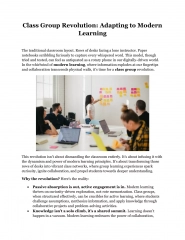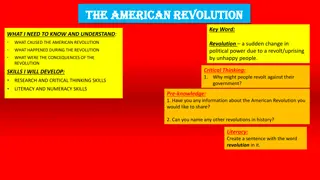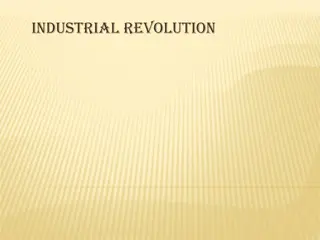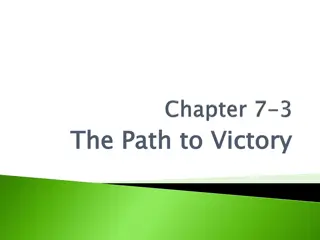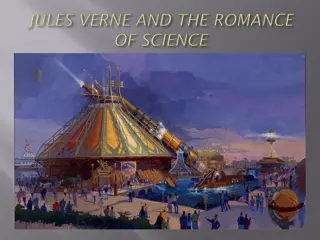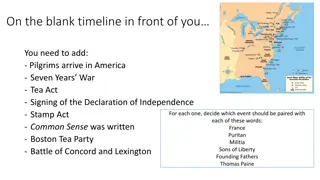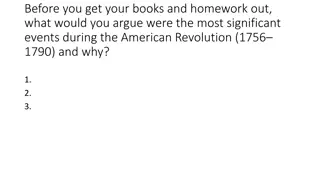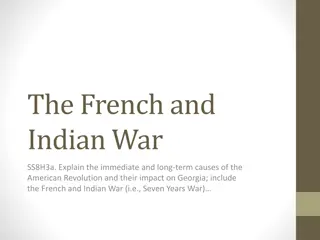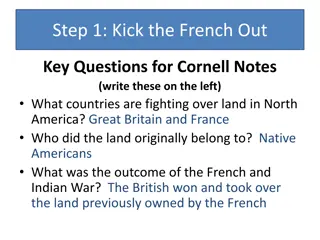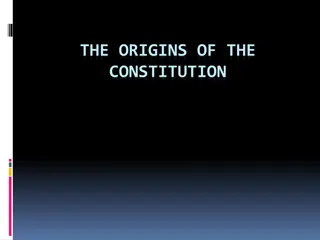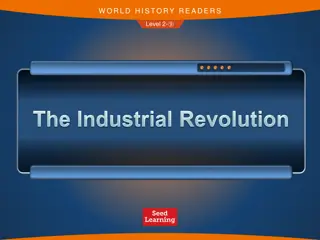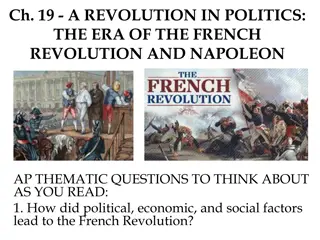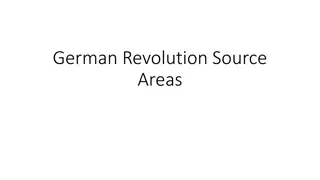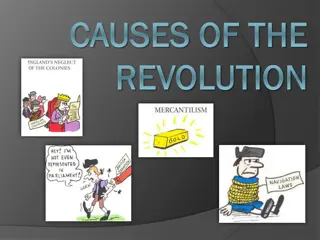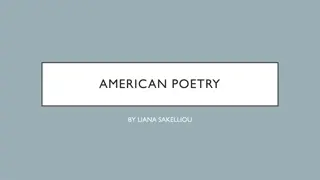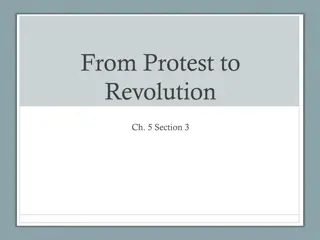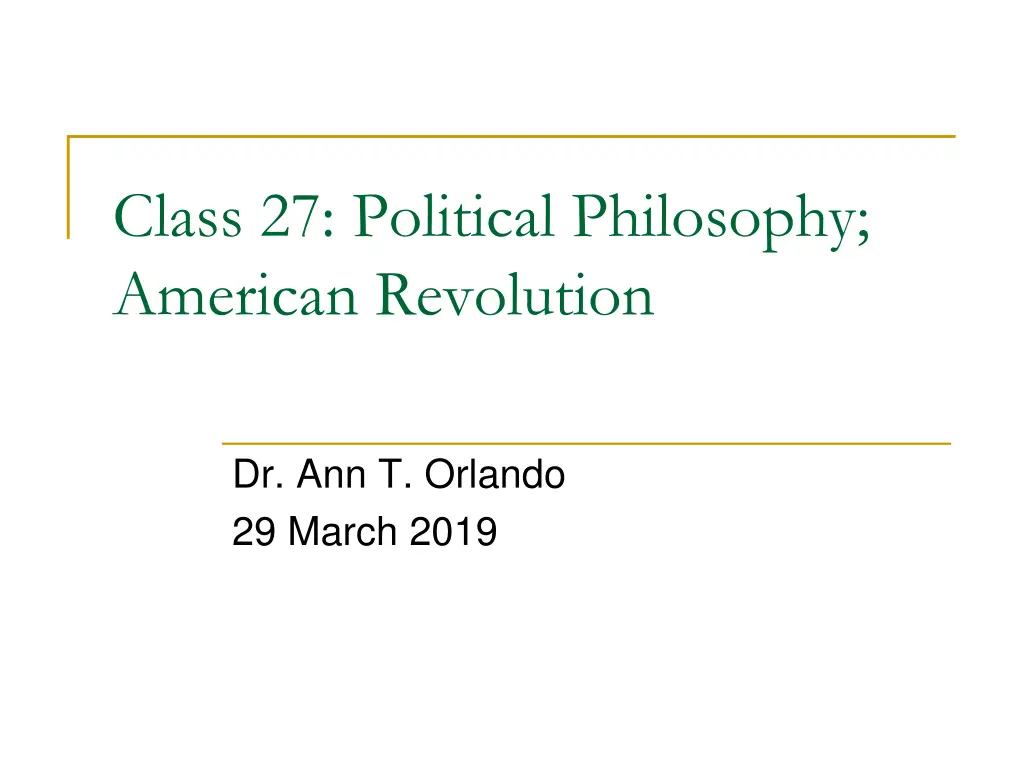
American Revolution and Political Philosophy Overview
Explore the significance of the American Revolution within the context of political philosophy, contrasting it with the French Revolution. Dive into the impact of Enlightenment ideals on American culture and government, with a critical assessment of the French Revolution's outcomes. Delve into the dynamics of British colonization and the establishment of various colonies in America, uncovering their diverse religious and political influences. Experience the religious revival of the Great Awakening and its spread across the American colonies in the early 18th century.
Download Presentation

Please find below an Image/Link to download the presentation.
The content on the website is provided AS IS for your information and personal use only. It may not be sold, licensed, or shared on other websites without obtaining consent from the author. If you encounter any issues during the download, it is possible that the publisher has removed the file from their server.
You are allowed to download the files provided on this website for personal or commercial use, subject to the condition that they are used lawfully. All files are the property of their respective owners.
The content on the website is provided AS IS for your information and personal use only. It may not be sold, licensed, or shared on other websites without obtaining consent from the author.
E N D
Presentation Transcript
Class 27: Political Philosophy; American Revolution Dr. Ann T. Orlando 29 March 2019
My view and how it is different from Hitchcock The French Revolution was the climax of the Enlightenment Hitchcock has 10 pages devoted to the French Revolution, none on the American Revolution I do agree that French Revolution had the most dramatic effect on the Church at the time American system of government and liberal American culture are the climax of the Enlightenment Most Enlightened person was T. Jefferson The real Enlightenment Revolution was the American Revolution Successful American Culture dominates most of the world By any standard, the French Revolution was an abysmal failure
British in America: 17thC Spain and Portugal had already laid claim to the best land in the Western Hemisphere in the 16thC Leaving England, Holland and France to scramble for less desirable northern lands From Gonzales, The Story of Christianity, Vol 2, p.218 (trying to balance Black Legend) Puritans less tolerant than the Inquisition Spanish conquistadors wanted Indians for their labor, and the missionaries saw them as fellow Christians; thus did not exterminate them; British wanted the land and so did engage in a process of extermination and containment (both before and after the Revolution)
British Colonies: 17thC Virginia: Established 1607 by Virginia Company to develop agriculture; Church of England and Puritans Carolinas: 1663, Established by aristocrats in England; needed to encourage settlers; John Locke wrote the Constitution Georgia: Founded to stop the Spanish in Florida; Anglican; populated by debtors as alternative to jail Maryland: Granted to Lord Baltimore by Charles I in 1632 as a way to find support among Catholics in England Pennsylvania: William Penn and Quakers New Jersey: Puritan New York: First Dutch, Reformed, then Anglican New England: Settled by Pilgrims for expressly religious, rather than economic, purposes; refuge from Charles I Congregationalism an outgrowth of Puritan (John Cotton 1584-1662) Harvard College 1636; motto Truth for Christ and the Church
American Colonies: Early 18thC Great Awakening Revival movement that started in Britain; quickly spread to America Pietistic, Anabaptist origins Encouraged personal religious experiences (Jonathan Edwards) Baptism was a sign that one had had such an experience Movement embraced all 13 colonies Supporters of Movement: Presbyterians, Baptists, Methodists became largest denomination in US by end 18thand in 19thC Those opposed, Anglicans, Quakers, Congregationalists lost membership
18thC French and American Political Philosophy Based upon John Locke Voltaire considered Locke one of the most important men of the previous generation One of Jefferson s three heroes (the other two being Bacon and Newton) John Adams thought John Locke one of most important men who ever lived Emphasize individual liberty and rights over duty to society Importance of written Constitutions as contract between people and Government
American Revolution: New Political Structures American Revolution (1776-1781), based on philosophy of John Locke (1632-1704) Champion of individual rights Religious toleration Not clear (still isn t) what is relation between religion and politics in America Most States had an official religion; see for instance John Adams Constitution of Massachusetts; oldest written Constitution still in use First Amendment to Constitution says only that Congress will not establish a religion; Thomas Jefferson extends this to separation of Church and State (1802)
Adams and Jefferson John Adams (1735-1826) Massachusetts, Puritan then Unitarian, Harvard; second President Abolitionist Thomas Jefferson (1743-1826) Virginia, Episcopalian then deist/atheist, William and Mary; third President Slave owner Declaration of Independence; close friends in France and during the Revolution; Became bitter enemies over election of 1800; Renewed friendship in old age; both die on 50thanniversary of signing Declaration of Independence, 4 July 1826
Jeffersons Religion Wrote a syllabus of Christianity (Letter to Benjamin Rush, 21 April 1803) Jefferson called himself an Epicurean (Letter to William Short, 31 October 1819) Letter includes a syllabus or summary of Epicureanism An exegesis of John 1:1 to demonstrate that Jesus was not God (Letter to John Adams 11 April 1823)
American Election of 1800 Choice between Adams vs. Jefferson: Role of Religion in Society and American view of French Revolution Jefferson was the Democratic-Republic party candidate Aaron Burr was running mate Adams (incumbent) was the Federalist party candidate Charles Pinckney was running mate Alexander Hamilton supported Adams (against Burr) Election tied in Electoral College, finally decided by a single vote in the House of Representatives
Key Issues Then (and Now) Category Adams Jefferson Belief in God Yes; God active in men s lives. Maybe; but even so, God not active in men s lives. Natural rights more important. Human nature and reason are perfectible; humanity is always making progress. Majority should rule as directly as possible. Should be rewritten every generation; an occasional revolution is a good thing. Religion is detrimental to civil society; should be completely separated from politics. Neither Fasts nor Thanksgivings Natural Law Human nature and reason Basis of government. Limited; prone to error Rule of majority Majority rule should be tempered by constitutional protections of minorities. Fundamental bedrock of civil government that should be enduring; order in society is very important. Very important for moral leadership; all religions should be tolerated although the State may favor one. Fasts and Thanksgivings Role of constitution Role of religion in civil society
Reading 1. Thomas Jefferson Letter to Danbury Baptist Association available at http://www.loc.gov/loc/lcib/9806/danpre.html 2. John Adams. Constitution of the Commonwealth of Massachusetts. Preamble and Part I Available at http://www.mass.gov/legis/const.htm
Suggested very partial bibliography The Adams-Jefferson Letters, ed. Lester Cappon John Ferling, Adams vs. Jefferson Susan Dunn, The Sister Revolutions Jefferson s Second Revolution, the Election Crisis of 1800 and the Triumph of Republicanism

